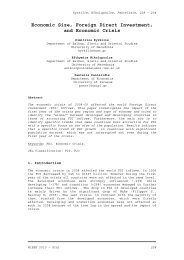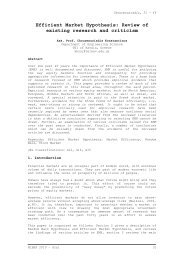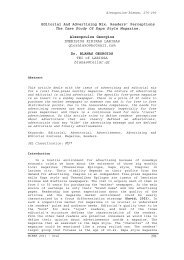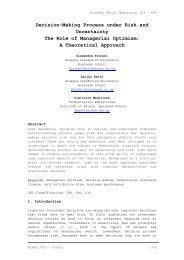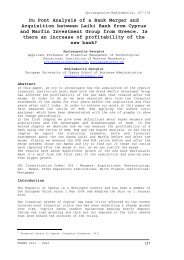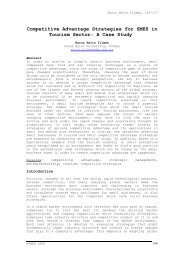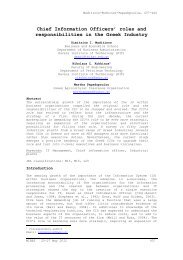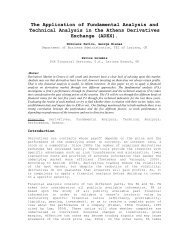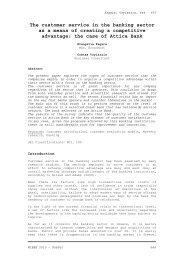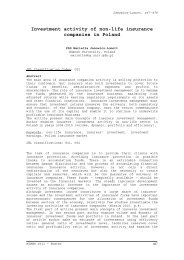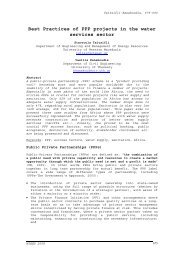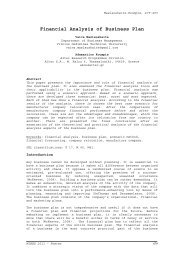Naco M., Gaxha V., Implementation of National Accounting ... - mibes
Naco M., Gaxha V., Implementation of National Accounting ... - mibes
Naco M., Gaxha V., Implementation of National Accounting ... - mibes
You also want an ePaper? Increase the reach of your titles
YUMPU automatically turns print PDFs into web optimized ePapers that Google loves.
<strong>Naco</strong>-<strong>Gaxha</strong>, 829-842<br />
very crucial considering the need <strong>of</strong> all economic sectors and<br />
government, for accurate and reliable information, as a key factor for<br />
their decision making process. The main objective <strong>of</strong> the reform was<br />
the adaptation <strong>of</strong> a new accounting system on the light <strong>of</strong> the drastic<br />
changes that were happening in Albania.<br />
However, besides the efforts, during this period, a lot <strong>of</strong> problems<br />
and issues were identified in both legislation and regulation<br />
framework: Law 7661 date 19.01.1993 “For <strong>Accounting</strong>” was not in line<br />
with International <strong>Accounting</strong> Standards; Law “For <strong>Accounting</strong>” and Law<br />
“For Commercial Entities” were written on the same time without having<br />
the possibility for coordination and harmonization <strong>of</strong> rules applied by<br />
both laws. Application <strong>of</strong> an <strong>Accounting</strong> Legislation, far from<br />
International Standards, brought up problems for foreign investors for<br />
the consolidation <strong>of</strong> their financial statements, etc.<br />
In order to address the shortcomings in the previous law, a new<br />
accounting law was enacted in 2004. So, the <strong>Accounting</strong> Law (1993).<br />
Complemented by General <strong>Accounting</strong> Plan which provided detailed<br />
guidance for all business entities in Albania was repealed when the<br />
new Law on <strong>Accounting</strong> and Financial Statements (2004) became effective<br />
on January 1 st, 2006. However, as a lot <strong>of</strong> delays happened, like: the<br />
translation process finished only end <strong>of</strong> 2006, just before the date<br />
set up for implementation, the pr<strong>of</strong>essionals involved in the process<br />
and moreover the government and public institutions were not prepared<br />
to start and assist the implementation process. In these conditions<br />
was decided to postpone the implementation date until January 1 st ,<br />
2008. This decision for postponement was the first signal that the<br />
implementation process was not going to be a smooth one.<br />
Referring to different studies and cases, we find that exist two<br />
different positions held by researches whilst analyzing this kind <strong>of</strong><br />
process. So, Cheney, (2002), draw attention to the fact that, in many<br />
countries within the EU, especially those countries with a local GAAP<br />
that is not particularly developed or where it quickly adjusts to<br />
international standards, will have no difficulties to prepare<br />
consolidated statements in accordance with IAS. In the other hand,<br />
Wilson (2001) believes that IAS implementation problem will be huge<br />
for many European companies. This is because Europe is embracing a<br />
future for financial reporting that is not necessarily that widely<br />
known or understood.<br />
In Albanian case, considering the basis <strong>of</strong> the old accounting system<br />
used, far from IAS principals, outdated in respond to the new economic<br />
development, not sufficient for the foreign investors interest, we<br />
believe that implementation process will have problems that need to be<br />
analyze.<br />
Methodology<br />
In order to give the reader the possibility to make his/her own<br />
judgement concerning the quality <strong>of</strong> the result (Gill & Johnson 1997),<br />
we will describe the method used.<br />
In this study, we have first compared the old accounting rules with<br />
new standards, and then analysed the consequences from different<br />
perspectives. Our approach, the abductive one, was neither to build up<br />
a new theory nor to test an existing one, as in induction and<br />
deduction. As the abductive approach is a combination <strong>of</strong> the deductive<br />
and the inductive approach (Alversson & Sköldberg, 1994), we started<br />
MIBES 2008 830



